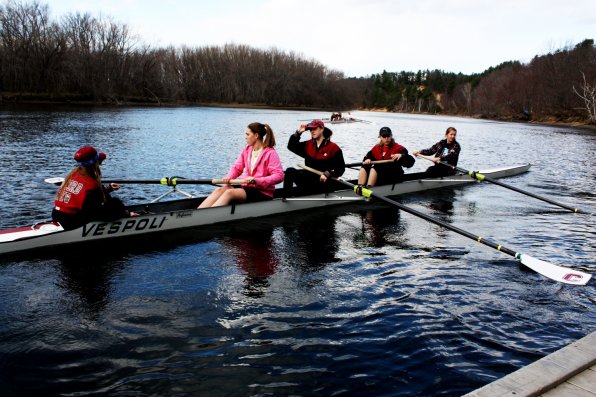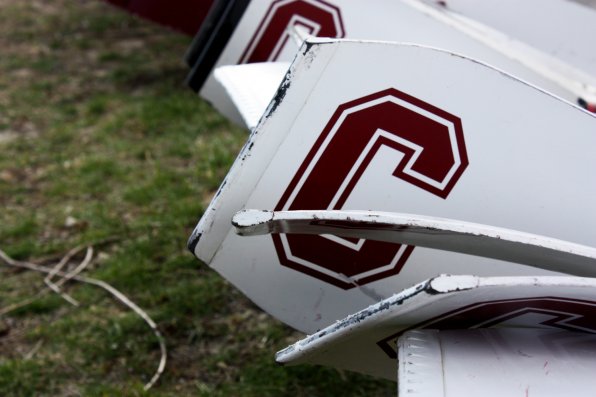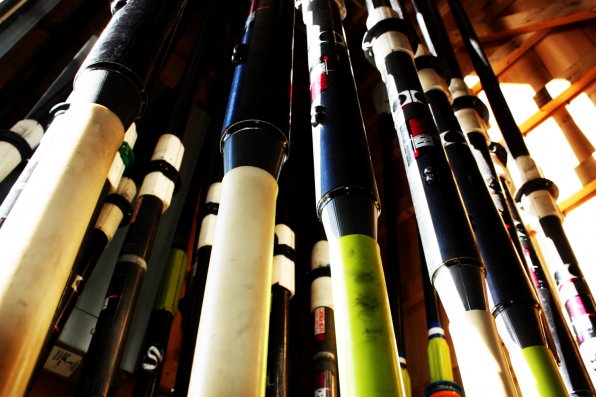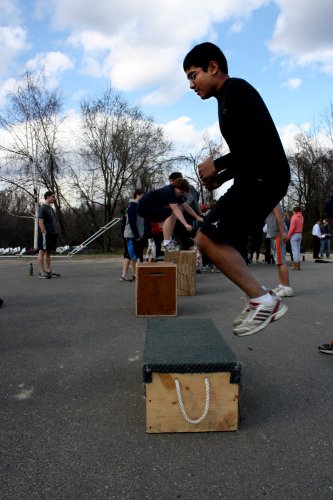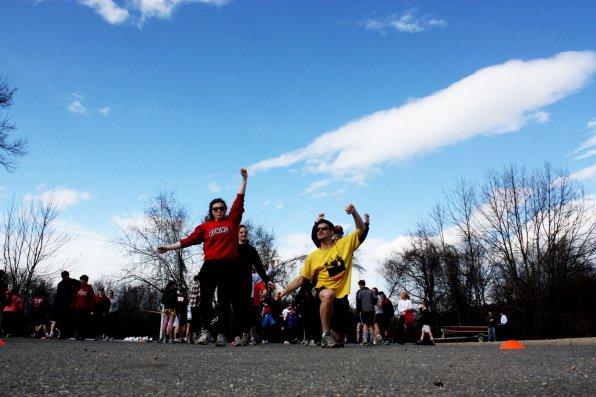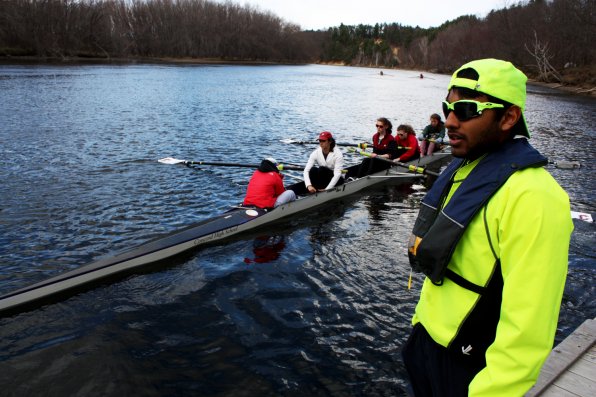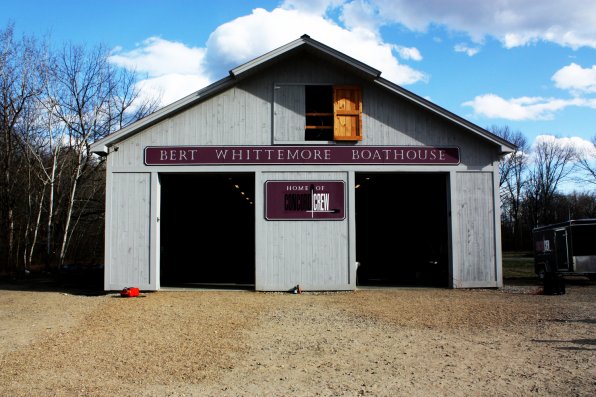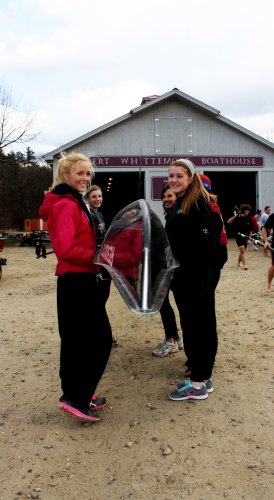Even as the roster ballooned to more than 60 students and the skill level began to rise appreciably, the members of Concord Crew couldn't shake the feeling that they were, well, sort of homeless.
Though they wore the Concord colors with pride, they were schlepping off to Hooksett every day, sometimes as early as 6 a.m., and sharing a boathouse with an archrival even though there was a river beckoning in their own backyard. It might have made for good reality TV – “Two Live Crews: Everyone Gets Along . . . Oar Else!” – but it wasn't conducive to growing a program.
The solution, it turns out, wasn't that far around the corner.
A groundswell of support, first from parents and later from city officials, led to the 2009 construction of a boat house behind Everett Arena, a facility that now houses dozens of boats and oars as well as training equipment and other necessities. And the whole thing took less than two years to build.
Now, with more than 100 students anxious to row every day and a place in town to do so, members of Concord Crew can barely remember the vagabond days.
“It's much more accessible,” senior Charles Shirley said. “It's really close, but it also feels like we can build around some sort of unity. In Hooksett, we were sharing a boathouse with a team that was somewhat of a rival to us. Now we have our own and we can sit and call this place home.”
While nobody has moved their sleeping bag and teddy bear into the boathouse – as far as we know – the students and coaches have certainly embraced the habitat with open arms. The team has grown by leaps and bounds, reaching a high of 111 rowers a few years back, and has seen a subsequent jump in talent level, as well.
“It increased our visibility, which increased our numbers, which made us more competitive,” head coach Jay Printzlau, who leads a staff of five coaches, said. “And it increased our connection to the community. The other thing it did was increase our practice time, because we don't have to travel.”
Not to practice. Regattas are another story. Concord Crew is a 401-C3 nonprofit and is therefore not funded by a school. The team attends regattas all over Massachusetts and as far away as Saratoga Springs, N.Y.
Without a bus.
So how do they get there? Picture the parents of more than 100 rowers cruising down the interstate with oars strapped to the roofs of their cars (note: creative license may have been taken in crafting the previous image. No oars are actually attached to automobiles – they travel along with other equipment in a trailer – nor does Concord Crew or the Insider condone such behavior.)
“We always have more fans (at regattas) than schools that take buses,” Printzlau quipped. “We've put on dinners in Saratoga Springs for over 300 people. It's a big crowd when we all get together.”
That dedication has become the hallmark of the program. What began as a humble venture has turned into a fiercely competitive family of athletes who have found deep bonds on the water.
They practice early and late, massaging school work into the remaining hours, and have found success with a program where their athletic ventures have otherwise taken detours.
“The thing that's been the most satisfying is seeing the growth, kid-by-kid, because this is a humble group,” Printzlau said. “These are kids that didn't do so well at Little League, these are kids that sat on the bench playing soccer, and they had this second opportunity to be athletes. For kids that aren't great at ball sports, this is really neat to see these timid, unsure kids turn into really pretty high-level athletes.”
That level is indisputable. Concord Crew has begun to emerge as a threat in almost any regatta it attends, but that's hardly the only measuring stick. Several former athletes are rowing in college, and four students who will graduate this year are already slated to continue at the next level, including Marisa Landry, who netted a full scholarship to the University of Rhode Island.
“I used to swim, and that's all on your own. So I kind of like the aspect that you are with your seven other girls in your boat,” Landry said. “I know I've made so many friends during crew.”
Camaraderie is a huge part of the process. The boys and girls teams warm up together in the parking lot outside of the boat house, plowing through a series of dynamic stretching exercises to tunes selected for the day's workout, and generally leave feeling more like relatives than classmates.
“I've always done track and inpidual things, but crew is the ultimate team sport. You have to make sure you are always working with the people in your boat. You can never ignore your teammates,” Jill Lanney said. “It's really taught me how to work with others and value a team.”
Said Nick Muccio: “I didn't know what I was getting into when I started. I'd never really done anything athletic as a sport before this. But it's taught me the benefits of dedication and hard work. You get out what you put into it. Everyone just loves each other here, and it's been a really good experience.”
Printzlau embraces that mentality, often leaning on the veteran rowers to help immerse younger athletes into the program. He also stresses the fact that the team has no bench, that everyone rows at every practice and regatta.
With practice taking up more time than some other sports – the team gathers at 4 p.m. on weekdays and isn't often finished until 6:45 – the veterans also play a key role in advising younger students on how to properly balance sports and school work.
Eric Sargent, whose daughter, Hannah, rows on the team, has seen the benefits first-hand.
“She very much loves the togetherness, working with a group, the focus. Everybody has to be in sync,” Sargent said. “She's become a driven student herself. They spend a lot of time here, so you have to prioritize, get your work organized. The structure here helps her carry that structure over to school and other parts of her life.”
Printzlau tries to leave no detail to chance. Concord Crew is one of only a handful of teams in North America to put the students in life jackets in inclement weather, he said, and though the vast majority of participants are from Concord, students from Bow and Hopkinton have also joined the team.
Similarly, athletes must pay $400 per semester, but Printzlau said “we have never turned anyone away for an inability to pay. We find the money for the kids that can't afford it.”
The fees from the students go to cover general day-to-day operations and race entry fees – which can be as high as $1,800 – while the team relies on fundraising throughout the year to purchase new equipment, none of which is cheap.
A handful of new boats in the boathouse cost $28,000 each, Printzlau said, while the team's preferred model – most recently purchased in 2009 – runs closer to $37,500.
Any money spent is more than worth it to Printzlau, though. His resume includes a stint as a team member at Yale and later as a coach both at his alma mater and Syracuse University, and he'd still take the experience with Concord Crew over any of that.
Having jumped on board in 2005 and helped to steer the program to its current home, he can't wait to see what the future holds.
“This is far more satisfying,” Printzlau said of the comparison to coaching a big-time college program. “The kids appreciate it, and there is so much enthusiasm at this learning level. We have kids here who at the start of their careers weren't winning, didn't understand, and now have built something for themselves that's fast and respectable. The enthusiasm is unmatched. I wouldn't trade it.”

